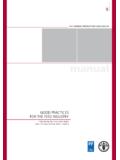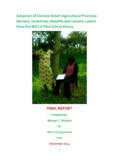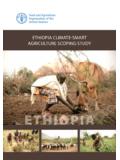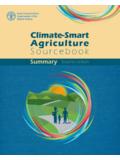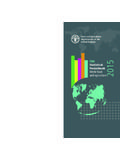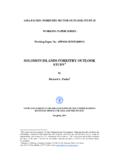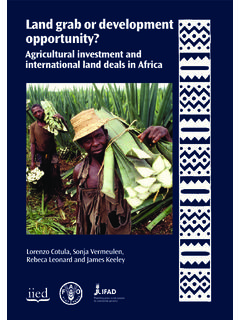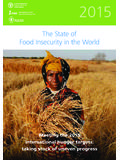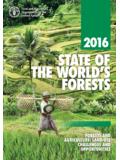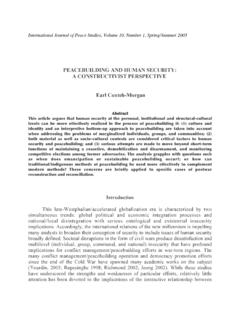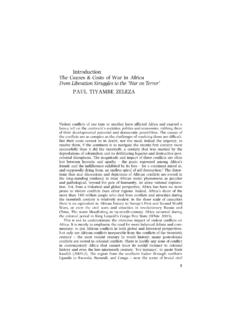Transcription of Food Security and Its Implications for Political Stability ...
1 Food Security and its Implications for Political Stability : a humanitarian perspective ROME, 13-14 SEPTEMBER 2012. Food Security and Its Implications for Political Stability : a humanitarian perspective Prepared by Daniel Maxwell, Feinstein International Center, Tufts University This paper was originally prepared for Global held at Cornell University, Ithaca, NY, June 18 19, 2012. The paper is used for the High Level Expert Forum on Addressing Food Insecurity in Protracted Crises, Rome, Italy, 13 14 September, 2012 with the permission of the organizers of that workshop and of Scitor Corporation. The designations employed and the presentation of material in this paper do not imply the expression of any opinion whatsoever on the part of the Rome-based agencies (FAO, IFAD, WFP) or their governing bodies, or the CFS and its governing bodies concerning the legal or development status of any country, territory, city or area or of its authorities, or concerning the delimitation of its frontiers or boundaries.
2 The views expressed in this document are those of the author(s) and do not necessarily reflect the views of FAO, IFAD, WFP the CFS their governing bodies. 1. Food Security and its Implications for Political Stability : a humanitarian perspective Note from the author: I would like to acknowledge feedback on earlier drafts of this paper from Peter Walker and Antonio Donini. Since some of the following is rather speculative, I prefer to explain, at the outset, the perspective that I bring to this discussion. I tend to subscribe to the Dunantist notion of the separation of humanitarian action from partisan politics in warfare and conflict, to ensure the overriding priority of the humanitarian imperative, and so that humanitarian actors can, in the words of the International Committee of the Red Cross, enjoy the confidence of all sides (or at least try to).
3 On the other hand, particularly where food Security is concerned, it is very difficult and frequently counter-productive to firewall humanitarian action from longer-term risk reduction, safety net, and recovery types of programming. And in many contemporary conflict situations, it is not clear that humanitarians any longer enjoy the confidence of any side, in part because they have been manipulated by just about everybody (including themselves). In a sense, then, I tend to reflect something of a situational ethic with regard to the primacy of humanitarian independence and neutrality depending largely on the degree to which conflict is the cause of the crisis. Second, I am currently an academic, based at a research institute that works on humanitarian disasters, but I have spent most of my career as a practitioner, not an academic.
4 I tend to look at humanitarianism not just as a phenomenon to be understood or explained in its own right, but also as a field of practice in urgent need of improvement and reform. This no doubt affects my ability to step back and analyze the humanitarian system as a whole. Lastly, most of my working career and virtually all my research have focused on Eastern and Central Africa. I try to draw examples in this paper from elsewhere, but most of my perspective is informed by that particular geographic and Political context. 1. Food Security and its Implications for Political Stability : a humanitarian perspective Introduction The 2011 famine in Somalia put humanitarian food Security crises starkly back on the agenda of the international community. With its causes linked not only to environmental, climatic, and food price factors, but also to internal conflict, competition among regional powers and the global war on terror, the Somalia famine raised anew, many long-standing concerns about the link between extreme food Security crises and Stability , Security and other Political imperatives.
5 The Somalia famine may have been an outlier in terms of the severity of the crisis and the extent of human suffering it engendered, but the famine was in many ways characteristic of the kinds of crises likely to be experienced in the medium-term future at least in terms of kinds of drivers involved, if (hopefully) not in terms of the magnitude of the human consequences. The causes and consequences of these crises as they relate to Political Stability are important to understand. This paper explores the linkages between food Security and Political Stability from a humanitarian perspective . humanitarian agencies and actors have traditionally been called upon to respond to crises of various kinds, to protect human life and dignity, and to contain human costs of crises. Food insecurity has been both a cause and a consequence of those crises, but for much of recent history, the humanitarian establishment has been focused primarily on the latter ( , the consequences).
6 In this paper, I will trace the recent evolution of food Security crises and the humanitarian response to those crises, to draw some conclusions about the nature of the relationship between food Security and Political Stability , and to suggest the major challenges facing policy makers trying to address these two concerns. The paper is structured as follows: First, I examine the types of humanitarian emergencies experienced in recent years, their historical causes and newly emerging drivers of crisis, and the consequences of these crises. Second, I explore different kinds of humanitarian actors, consider the way humanitarian action has grown in importance, and raise some issues about whose responsibility it is to respond to crises as well as emergent trends in responding to these crises.
7 After that, I explore a number of contemporary trends and constraints on humanitarian action to prevent, mitigate, or respond to emergencies in the future, the Implications of these constraints for the relationship of food Security and Political Stability , and what could or should be done to address these constraints. I use a brief synopsis of the Somalia famine of 2011 12 to explore the Implications of a number of these themes. Types of crises, drivers of crises Acute food insecurity is frequently the result of humanitarian disasters of different types. Classically, disasters were divided by their nominal causal factors ( nominal in this case because crises are rarely, if ever, caused by a single factor predominant triggering factor is probably a better way of categorizing crises).
8 1. Food Security and its Implications for Political Stability : a humanitarian perspective Figure 1. Number and causes of food Security crises, 1981 2007. Source: (FAO/WFP, 2008). These include rapid-onset natural disasters those that generate little if any specific warning at all such as earthquakes and tsunamis or those that might be generally predictable but not the specifics about precisely where and when (storms, floods, etc.); slow-onset natural disasters mainly droughts that take several months or even years to develop, thus enabling (at least in theory) some amount of mitigation and preparation for response; and human-made disasters often involving conflict, but sometimes being driven by Political factors or government policy without overt or militarized conflict. For example, the prolonged crisis in Zimbabwe and the famine in North Korea in the mid-1990s, were both cases in which there was a major food Security crisis that was caused almost entirely by Political factors, but which were not overtly militarized conflicts.
9 Several observations about humanitarian crises should be underlined here. First, the number of disasters has grown. Figure 1 depicts the number of food Security crises, breaking them down only by the (relatively artificial) categories of natural and human made. Figure 2 depicts the number of natural disasters since the turn of the nineteenth century, the numbers of people affected, and numbers killed. While some of the data in Figure 2 no doubt result from more comprehensive reporting systems, there is little doubt that both the number of disasters and number of people affected have grown. Better response and mitigation have reduced the number of fatalities. 2. Food Security and its Implications for Political Stability : a humanitarian perspective Figure 2. Number of Disasters, People Affected and People Killed, 1900 2010.
10 Source: (EMDAT-CRED, 2012). Second, while the causes of crises are both natural and human-made, the consequences of crises that are more human-made (particularly conflict-driven) are more difficult for the humanitarian community to manage. Figure 3 depicts the relative budgets of contemporary humanitarian response to different kinds of disasters, and makes clear the extent to which international response is heavily focused on conflict emergencies. Many if indeed not most humanitarian disasters today are triggered by some combination of factors, both natural and human-made (FAO/WFP, 2010). Political instability can be the consequence of either kind of disaster. Sometimes, natural disasters can be a source of significant Political instability such as the 2010 Haiti earthquake. Past famines in Ethiopia (1972 73 and 1984.)

